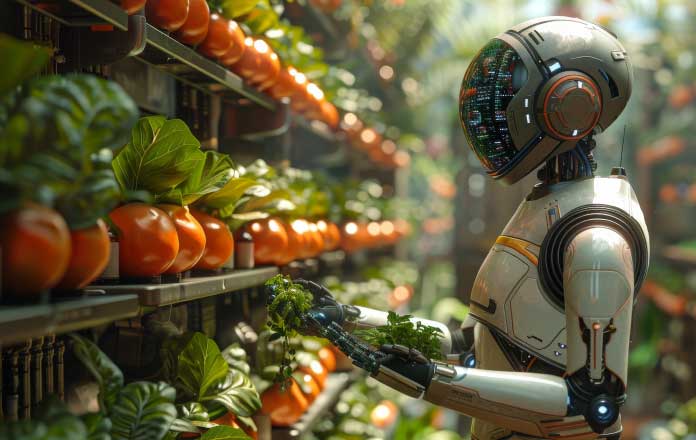With its vast agricultural landscape and diverse crops, India has always relied heavily on its agricultural sector. However, climate change, resource scarcity, and fluctuating market demands have made traditional farming practices increasingly unsustainable. In this era of technological advancement, Artificial Intelligence (AI) emerges as a transformative force that promises to revolutionize the Indian agricultural sector.
Enhancing Crop Yield:
AI-powered technologies offer solutions to optimize crop production by analyzing various factors such as soil health, weather patterns, and pest infestations. Machine Learning algorithms can process vast amounts of data to provide farmers with actionable insights, enabling them to make informed decisions regarding planting schedules, irrigation management, and crop protection strategies. By harnessing AI, farmers can maximize crop yield while minimizing resource utilization, thus contributing to sustainable agriculture practices.
Precision Farming:
One of the most promising applications of AI in Indian agriculture is precision farming. By utilizing sensors, drones, and satellite imagery, AI systems can monitor crop health in real time and identify areas requiring attention. For instance, drones equipped with multispectral cameras can detect crop stress, nutrient deficiencies, or weed infestations with high precision. This information empowers farmers to apply fertilizers, pesticides, and water only where needed, reducing wastage and increasing efficiency.
Weather Forecasting and Risk Mitigation:
Agricultural productivity is significantly at risk from unpredictable weather patterns. AI algorithms can analyze historical weather data, satellite imagery, and atmospheric models to provide accurate short and long-term forecasts. By receiving timely weather predictions, farmers can mitigate risks associated with droughts, floods, or extreme temperatures. Moreover, AI-powered risk assessment tools can help farmers secure appropriate insurance coverage, ensuring financial stability in the face of crop failures.
Market Intelligence and Supply Chain Optimization:
AI technologies can also streamline the agricultural supply chain by providing market intelligence and optimizing distribution networks. Machine Learning algorithms can analyze market trends, consumer preferences, and pricing dynamics to help farmers make informed decisions about crop selection and pricing strategies. Furthermore, AI-powered logistics systems can optimize transportation routes, storage facilities, and inventory management, reducing post-harvest losses and improving market access for farmers.
Empowering Smallholder Farmers:
In India, the majority of farmers are smallholders with limited access to resources and technology. AI has the potential to democratize agricultural knowledge and empower small-scale farmers to improve their livelihoods. Mobile applications and voice-based interfaces can deliver personalized agronomic advice to farmers in regional languages, enabling them to adopt best practices and increase productivity. Additionally, AI-driven market platforms can connect farmers directly with buyers, eliminating intermediaries and ensuring fair prices for their produce.
Challenges and Considerations:
While the prospects of AI in Indian agriculture are promising, several challenges need to be addressed to realize its full potential. These include issues related to data privacy, infrastructure limitations, and the digital divide. Moreover, there is a need for capacity building and skill development to enable farmers to effectively utilize AI technologies. Policymakers, researchers, and industry stakeholders must collaborate to develop regulatory frameworks, invest in infrastructure, and promote inclusive innovation in the agricultural sector.
AI has the power to revolutionize Indian agriculture by optimizing crop production, mitigating risks, and enhancing market access for farmers. By harnessing the potential of AI technologies, India can achieve food security, environmental sustainability, and economic prosperity in its agrarian landscape. However, concerted efforts are required to overcome challenges and ensure that the benefits of AI are equitably distributed among all stakeholders in the agricultural value chain.





